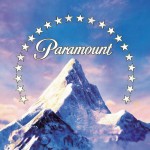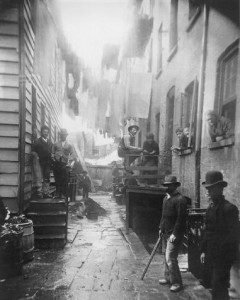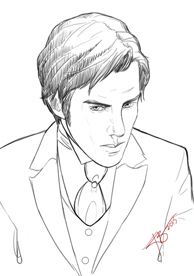
As more information comes to about this development, you can be sure to see it updated here.

As more information comes to about this development, you can be sure to see it updated here.
Today, March 15, marks the 20th anniversary of The Alienist’s publication. Over the past 20 years, this much loved and groundbreaking novel has been published in 35 different formats and editions, and is now considered a “modern classic”. What an amazing achievement!
A few months ago I asked 17th Street visitors to provide ideas for the best way to commemorate the 20th anniversary, and I received some wonderful suggestions. However, as most of the proposed ideas required a physical presence in New York, and I’m located nine and a half thousand miles away on the other side of the world, unfortunately I had to rule the majority of the suggestions out. So, after lots of thinking, I concluded that perhaps the best way to celebrate the anniversary would be through a new content feature that emphasised time, and thus the idea to recreate The Alienist’s original text based timeline for the site was born.
The new timeline is now up and is fully interactive. It contains maps of key locations for particular dates and chapters, as well as markers for key international, national, and local events, thereby placing the novel’s sequence of events within a wider historical context. A few short film clips from 1896 have also been interspersed in appropriate sections of the timeline. The interactive timeline has a permanent place in The Alienist subsection of 17th Street, but a copy has also been included for interested visitors below. I hope you enjoy the new feature. If you notice any major historical events that I have forgotten to add, please feel free to contact me and I will amend the timeline.
In addition to my own commemoration of the occasion, The Bowery Boys have also put together a fantastic article detailing some of the key historical locations used within the book to mark the 20th anniversary. Do check it out!
Finally, on a personal note, I would like to thank Caleb Carr for his wonderful novel(s). I can’t speak for others, but The Alienist, and its sequel, have been that very rare kind of book that really has “changed my life” in more ways than is apparent through this website, and for that I have no adequate way of saying thank you.
[timeline src=”http://docs.google.com/spreadsheet/pub?key=0AnGirj3rPR9IdGpNdUdBV0NsN2JBVGxXbW8zZGs0c2c&output=html” width=”100%” height=”650″ font=”AbrilFatface-Average” maptype=”sterrain” lang=”en” ]
Over the past fortnight, I have provided my responses to the NY Public Library Reader’s Den discussion points for The Alienist’s Part I: Perception and Part II: Association. This week’s Part III: Will discussion points were perhaps the trickiest of all, especially for me as a non-New Yorker, but I’ll still give them a shot.
You can read the final insight the question refers to here. My mind is immediately drawn to what is probably my favourite passage in the entire novel, found all the way back in Chapter One:
The country, [Kreizler] declared tonight, really hasn’t changed much since 1896 … We’re all still running, according to Kreizler — in our private moments we Americans are running just as fast and fearfully as we were then, running away from the darkness we know to lie behind so many apparently tranquil household doors, away from the nightmares that continue to be injected into children’s skulls by people whom Nature tells them they should love and trust, running ever faster and in ever greater numbers toward those potions, powders, priests, and philosophies that promise to obliterate such fears and nightmares, and ask in return only slavish devotion.
In my view, The Alienist and The Angel of Darkness are as much a commentary on today’s society as they are on society of the 1890s, so it should come as no surprise to any regular visitor of 17th Street that I wholeheartedly agree with the above passage and final insight regarding the killer, and believe they are just as applicable now as they were for the time period in which the books are set. Although we’ve come a long way in many respects, in others we’re as blind as we’ve ever been — perhaps worse, in some ways, with the escapism certain technologies have provided along with the band-aid solutions certain drugs have provided. But that’s a topic for another day.

As for whether the class contrast still resonates, I’ll leave that one up to New Yorkers to answer. The only thing I will say, being from overseas, is that a comment on the recent New York Times Big City Book Club chat about Jacob Riis’ How The Other Half Lives struck me: “The HALF is now the ONE PERCENT. Looks like we need to review our arithmetic…” If that really is the case, I wonder how it might influence a third Alienist book, assuming Mr. Carr does decide to write one. Will it affect the parallels New Yorkers could draw from the book? Will it affect how Mr. Carr would choose to write the book? Mr. Carr certainly hasn’t been shy in expressing his opinions on the new class divides (or lack thereof) in the city in recent months.
Corruption — it’s a universal theme that pervades the novel. This was an era when Tammany ruled New York; when police captains were rewarded with transfers to the most lucrative graft precincts in the city, thereby ensuring the protection of brothel and dive owners provided they could continue making the required payoffs; when agents for reformers were found guilty of blackmailing the same individuals they were supposedly trying to clean up; when the largest slum landlord in New York was the Episcopal Church; and when the Catholic Church relied on the donations of thousands of immigrants barely surviving in the crowded tenements of New York. Where money and power is concerned, I think the Paul Kelly of the novel said it best: “It’s a sucker bet, a crooked game, whatever you want to call it, and there’s a part of me that just wouldn’t mind seeing it go the other way for a little while.” Although, obviously, I don’t quite agree with Kelly’s methods!
I believe that I’ve adequately explained my view on Kreizler’s portrayal in my responses for Part II. I absolutely agree that further background for the Isaacson brothers would be fascinating, though. Other than the tidbit we were told about the brothers being drawn to detective work after reading Wilkie Collins as boys, we know very little of their individual or shared motivations and background. My fingers are crossed that such an explanation will be provided to us one day in a third book.
The image the brainteaser refers to in the blog post a little unclear, but I’ll suggest the Croton Reservoir. And for anyone who doesn’t know where that particular structure figures into the book… well, you’ll just have to keep reading!
Thanks to the NY Public Library Reader’s Den for the interesting discussion points this month! It’s been fun.
Last week I provided my responses to the NY Public Library Reader’s Den discussion points for The Alienist’s Part I: Perception. This week’s Part II: Association discussion points required a bit more thinking! I’m looking forward to seeing what the discussion points are for Part III: Will.
These discussion points follow from a brief character analysis in the Part II Reader’s Den blog which states, in part, that, “Moore is, in many ways, the opposite of his friend, Kreizler; passionate and headstrong where Laszlo is intellectual and clinical,” and, “At times [John] can seem naive but this is just a byproduct of how deeply he sees into others.” Unfortunately, I’m afraid that I’m going to have to start my response by saying that while I agree John and Kreizler are, to a degree, different sides of the same coin (more on that below), I disagree with the aforementioned interpretation of their characters, and therefore with the premise for these discussion points. Sorry, Reader’s Den!
As one might be able to gather from the character analyses I’ve included on this site, “passionate” and “headstrong” are adjectives I would be more inclined to use in describing Kreizler than John. This impression began, for me, as early as John’s first meeting with Kreizler at Bellevue Hospital in which he describes his friend as appearing reminiscent of a “hungry, restless hawk determined to wring satisfaction from the worrisome world around him,” and continues throughout the novel, with Kreizler exhausting himself by working tirelessly on the case, and, as we discover in Part II, falling victim to the “psychologist’s fallacy” (see Chapter 24). However, it was not John who first became aware that something deeper than professional interest was driving Kreizler’s tireless work during the investigation. It was the insightful Sara Howard who, despite having known Kreizler for only a fraction of the time his life-long friend John had known him, was able to see what John could not: that Kreizler’s motivation in the investigation was “more than just his reputation, and more than just scientific curiosity. It’s something old and deep.” As she patiently explains to the confused John, “He’s a very deep man, your friend Dr. Kreizler.”

As an aside, I actually find it somewhat ironic that it is John who first describes Kreizler as being emotionally distant, when I see John as being just as emotionally distant as Kreizler, albeit in a different way. It is in this respect that I see John and Kreizler as being two different sides of the same coin. Where John avoids his emotions, Kreizler suppresses his and engages in long periods of self-reflection in order to be sure that he is acting appropriately on any subject that requires emotional investment (as we’re about to discover regarding a certain woman he is interested in during Part III). Consequently, his falling victim to the “psychologist’s fallacy” may have been due to the spontaneous nature of the investigation not providing him with ample time to consider his motivations, rather than any lack of self-awareness.
So, all of that said, do I believe that John is too emotionally involved in the case for his own good? John unquestionably becomes emotionally involved in the case, as do most of the investigators, but I would argue this is primarily a result of his interactions with Joseph, the young boy he befriends while making enquiries in the case. When asked by Marcus Isaacson about the ease with which he engaged in conversation with Joseph, he avoids answering the question but privately comments in his narrative, “I had no desire to reveal how much young Joseph’s eyes and smile had reminded me of my own dead brother’s at the same age.” Thus, there is certainly more to John than meets the eye, but it appears to me that it is John’s lack of emotional self-awareness rather than an ability to “see [deeply] into others” that makes the most critical impact upon his actions during the investigation. And, yes, I think the particular combination on the team of emotional perceptiveness (on Kreizler and Sara’s part) and emotional naiveté (on John’s part) do provide good counterweights during the investigation.
In answering the previous discussion points, I believe I’ve already provided my response regarding Kreizler’s motivation. Regarding John’s motivation, I’ll answer with a direct quote from the novel.
The Alienist, Chapter 6:
If it seems odd that I offered no further protest, I can only say this: Kreizler’s explanation that his present course of action had been inspired by a document I had sent him years ago, coming as it did on the heels of our shared reminiscences about Harvard and Theodore’s mounting enthusiasm for this plan, had suddenly made it plain to me that what was happening in that office was only partly a result of Giorgio Santorelli’s death. Its full range of causes seemed to stretch much farther back, to our childhoods and subsequent lives, both individual and shared. Rarely have I felt so strongly the truth of Kreizler’s belief that the answers one gives to life’s crucial questions are never truly spontaneous; they are the embodiment of years of contextual experience, of the building of patterns in each of our lives that eventually grow to dominate our behaviour. Was Theodore — whose credo of active response to all challenges had guided him through physical sickness in youth and political and personal trials in adulthood — truly free to refuse Kreizler’s offer? And if he accepted it, was I then free to say no to these two friends, with whom I had lived through many escapades and who were now telling me that my extracurricular activities and knowledge — so often dismissed as useless by almost everyone I knew — would prove vital in catching a brutal killer?
As for John’s motivation in continuing with the case when things get tough, I think we can put it down to two elements. First, he mentions early in the novel that the “voice whispering in the back of [his] head: ‘Hurry up or a child will die!'” was one strongly motivating factor. Second, I feel that the passion of the other team members — particularly Kreizler and Sara — pulled John through some of the more difficult phases of the investigation.
But, as always, this is only my interpretation! If you would like to present an alternative viewpoint, you’re more than welcome to do so in the comments below.